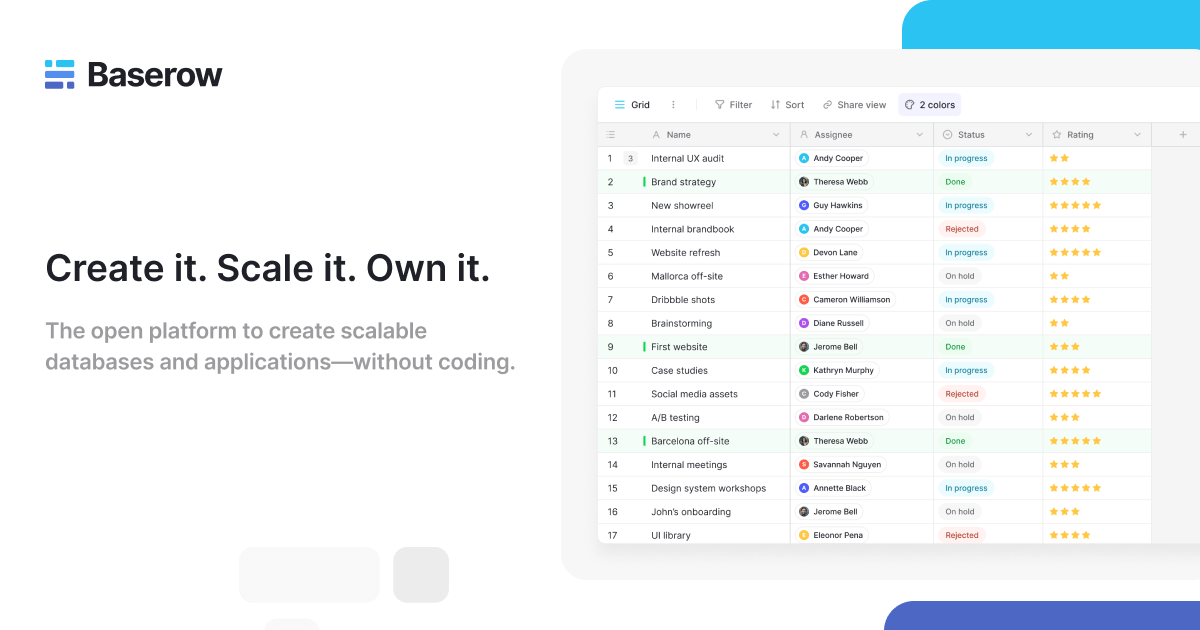Easy Open Platform Database Production Using No-Code Innovation
Easy Open Platform Database Production Using No-Code Innovation
Blog Article
Exploring the Advantages of Scalable Data Sources That Call For No Coding Skills for Efficient Data Administration Solutions
The development of scalable data sources that get rid of the necessity for coding skills presents a transformative chance for companies seeking efficient data administration remedies. By allowing non-technical users to harness the power of information with instinctive interfaces, these systems enhance access and foster cooperation throughout varied teams. Moreover, their cost-effectiveness and versatility to progressing organization demands can significantly enhance functional processes. As we think about the ramifications of such innovations, it becomes critical to examine just how they can improve the landscape of information management and drive lasting development in a competitive atmosphere.
Boosted Access for Users
Enhanced availability for individuals is a vital aspect of scalable data sources, making certain that information administration systems are intuitive and user-friendly. In a period where data-driven decisions are paramount, access permits a broader variety of customers, consisting of those without substantial technical know-how, to engage with database systems efficiently. This democratization of information gain access to assists in boosted cooperation across departments, encouraging workers to remove insights and make educated choices.
Easy to use interfaces, such as visual information and drag-and-drop attributes depiction, streamline complicated information interactions. These enhancements decrease the knowing curve linked with traditional database administration, making it possible for individuals to concentrate on leveraging information rather than grappling with technical complexities. Additionally, scalable data sources commonly incorporate adjustable control panels and real-time analytics, giving users with immediate understandings customized to their details needs.

Cost-Effectiveness and Source Savings
Efficient data administration not only depends upon accessibility yet additionally on cost-effectiveness and resource savings. Scalable databases designed for customers without any coding skills considerably minimize financial problems usually related to conventional database management systems. By getting rid of the requirement for specialized programs proficiency, organizations can designate their sources more effectively, focusing funds on core business activities instead of considerable training or hiring competent employees.
Moreover, these data sources typically make use of cloud-based options, which better decrease expenses connected to hardware and maintenance. Organizations can scale their database solutions according to their needs, preventing the expenses incurred from over-provisioning resources. This versatility means organizations can adjust to changing needs without incurring unneeded expenses, resulting in substantial long-lasting cost savings.
In addition, easy to use user interfaces improve data entry and monitoring procedures, minimizing the time invested on administrative jobs. This efficiency equates right into labor expense financial savings, permitting teams to concentrate on tactical initiatives instead of regular maintenance. Overall, taking on scalable data sources that call for no coding skills promotes an extra affordable method to information management, enabling companies to optimize their resources while preserving high degrees of functional performance.
Improved Partnership Throughout Teams

Moreover, scalable databases assist in seamless communication amongst staff member. their website With straightforward user interfaces that need no coding abilities, staff members can conveniently produce, modify, and share records or control panels tailored to their details needs. This democratization of data equips non-technical customers to contribute insights, enhancing the joint environment.
Furthermore, these databases support concurrent accessibility, enabling several users to work with the exact same dataset at the same time. This feature enhances efficiency, as teams can take part in joint data analysis without the risk of version control issues. The ability to leave notes or remarks directly within the database better advertises dialogue and makes clear information analyses.
Streamlined Data Administration Processes
In today's data-driven atmosphere, organizations recognize the need of structured information administration processes to take full advantage of effectiveness and accuracy. By leveraging scalable data sources that need no coding skills, companies can simplify their data handling and minimize the complexities typically associated with standard data source systems. This access encourages non-technical individuals to engage directly with information, assisting in quicker decision-making and decreasing dependence on specialized IT personnel.
Streamlined data administration procedures enhance workflow by automating regular jobs such as information entry, validation, and reporting. Automated information integration guarantees that information from numerous resources is accumulated perfectly, removing silos and fostering a merged view of important service metrics (no-code). Additionally, easy to use user interfaces permit employees to adjust data conveniently, allowing them to generate insights that drive tactical initiatives without the requirement for substantial training.
This effectiveness not only speeds up functional processes but likewise minimizes the capacity for human error, making certain that information stays exact and reliable. Inevitably, structured information administration processes via scalable data sources cause boosted efficiency, enabling organizations his comment is here to concentrate on core tasks while guaranteeing that their information monitoring practices are efficient and reliable.
Scalability for Growing Businesses

For broadening business, the ability to scale up or down is important. A scalable database can handle an increase of information produced from new consumers, items, or services, guaranteeing that business procedures stay continuous. These databases offer the ability to take care of peak lots successfully, which is necessary during periods of quick development or seasonal spikes.
Furthermore, numerous scalable database solutions are designed with user-friendly user interfaces that need no coding abilities, equipping non-technical team to handle data effectively (no-code). This democratization of data administration allows companies to designate resources strategically and lower dependence on specialized IT workers
Eventually, embracing a scalable database not only enhances operational performance yet also fosters a setting where services can innovate and progress without the constraints of typical database systems. This adaptability positions organizations for lasting success in today's affordable landscape.
Conclusion
In conclusion, scalable databases that call for no coding abilities provide considerable advantages for efficient data management. By streamlining data management processes and offering scalability for expanding organizations, such remedies make it possible for companies to adjust to transforming needs properly.
Boosted accessibility for users is an essential facet of scalable data sources, making sure that information administration systems are user-friendly and user-friendly.Straightforward interfaces, such as drag-and-drop functions and visual information representation, streamline complicated data communications. On the whole, taking on scalable data sources that call for no coding abilities fosters a much more affordable method to data management, making it possible for companies to optimize their resources while maintaining high degrees of functional effectiveness.
By leveraging scalable databases that call for no coding skills, companies can simplify their information handling and lower the intricacies commonly connected with traditional database systems - no-code.Structured information management processes improve workflow by automating regular jobs such as data entrance, validation, and coverage
Report this page